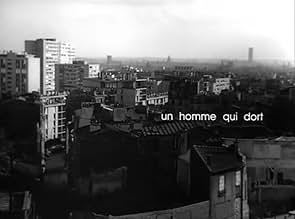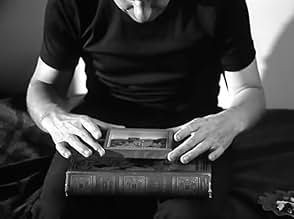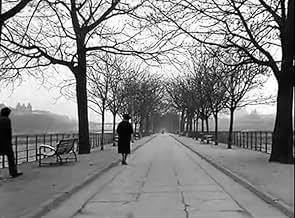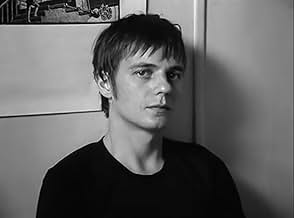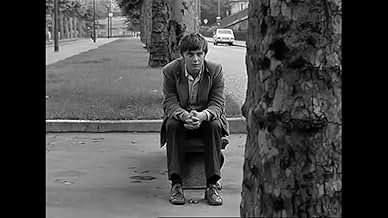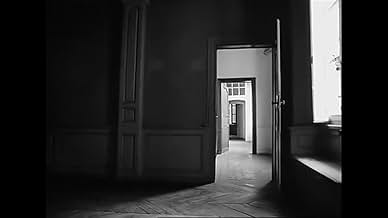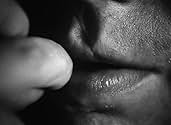IMDb-BEWERTUNG
7,9/10
5233
IHRE BEWERTUNG
Ein 25-jähriger Student in Paris wird gleichgültig gegenüber der Welt, die ihn umgibt, und verspürt in der Folge ein starkes Gefühl der Entfremdung und Hoffnungslosigkeit.Ein 25-jähriger Student in Paris wird gleichgültig gegenüber der Welt, die ihn umgibt, und verspürt in der Folge ein starkes Gefühl der Entfremdung und Hoffnungslosigkeit.Ein 25-jähriger Student in Paris wird gleichgültig gegenüber der Welt, die ihn umgibt, und verspürt in der Folge ein starkes Gefühl der Entfremdung und Hoffnungslosigkeit.
- Regie
- Drehbuch
- Hauptbesetzung
- Auszeichnungen
- 1 wins total
Ludmila Mikaël
- Narrator
- (Synchronisation)
- …
Empfohlene Bewertungen
Here, a truly great fusion of french cinema and existential meditation. Surely a modern classic ? A tonic for any modern young adult in the throws of angst or severe doubt and questioning about the world. A rite of passage i have observed in many a friend in my own life.
French cinema is in the habit of not letting you down. It thankfully goes all the way when it comes to philosophical comment. It's discourses articulating the feelings you long to, no need, must hear from the world.
Somewhere in the vaults there it sits underplayed. Play this film. So modest, so slight, so grave. The uplifting chant of a culture that knows how to speak. Perec the writer and director, a national treasure for a good reason.
French cinema is in the habit of not letting you down. It thankfully goes all the way when it comes to philosophical comment. It's discourses articulating the feelings you long to, no need, must hear from the world.
Somewhere in the vaults there it sits underplayed. Play this film. So modest, so slight, so grave. The uplifting chant of a culture that knows how to speak. Perec the writer and director, a national treasure for a good reason.
Just watched my whole life. Emptiness of the existence, the pain of existential crisis and the most painful things living, will and idea as Schopenhauer said. "Living painless" is the most painful thing, ironic, but this is the truth.
Ah, my own incapable existence... You are becoming numb when you don't think about the mean of existence and when you don't feel the pain of BEING. HUMAN BEING.
You want to be as usual but you can't, something's gonna stop you, you don't want to read books, you don't want to think, you're just gonna walk without thinking about anything.
Ah, my own incapable existence... You are becoming numb when you don't think about the mean of existence and when you don't feel the pain of BEING. HUMAN BEING.
You want to be as usual but you can't, something's gonna stop you, you don't want to read books, you don't want to think, you're just gonna walk without thinking about anything.
Famous French writer Georges Pérec was always interested in cinema. He notably took part in Alain Corneau's thriller "Série Noire" (1979) five years after this adaptation of his own novel. Shot by Bernard Quesyanne and awarded with the Jean Vigo prize, the filmmaker found an adequate cinematographic language to capture the somewhat desolate spirit of the novel.
A student who's about to end his studies decides overnight to stay completely indifferent to the world that surrounds him. It's a silent, black & white movie only enhanced by a woman voice over which introduces the young hero to the audience and comments from his own standpoint his actions. Although we don't know the reasons of his retirement from the world, we learn many things of his lifestyle: his bedroom, his wage, his eating habits, his wandering all over Paris etc... It's interesting to note down the mellow voice-over of the woman that gradually gets worried and angered. Indeed, our student is at first completely silent and indifferent but then anxiety, fear overcome here. Is it really possible to stay indifferent like that during a lifetime? Is there a possible exit?
This film could be a cousin of Alain Jessua's debut film "La Vie A L'Envers" (1964) in which a man stops to comply to the routine of everyday life. Such is also the case here. Only the voice-over enables the audience to penetrate the empty soul of this young man and to try to decipher his thoughts although as I previously said his motivations to refrain from social life remain blurred. Through him, Pérec wanted to express his view on French society but in a neutral way. He was always interested in it and showcased it in several of his books especially "La Vie: Mode D'Emploi" (1978). Given the anguished tone adopted by the voice in the second half of the film, the writer probably feels fear towards the banality and the mundane character of everyday life that offers no exits. Perhaps that's what our main hero tries to do: to stay in silence to try to discover another world. But it is bound to fail. So what to do?
Jacques Spiesser is perfectly directed and his expressionless faces capture the nothingness he voluntarily creates all around him. He is at the center of an arty film which tries and succeed to depict the humdrum common life that can verge towards absurdity.
A student who's about to end his studies decides overnight to stay completely indifferent to the world that surrounds him. It's a silent, black & white movie only enhanced by a woman voice over which introduces the young hero to the audience and comments from his own standpoint his actions. Although we don't know the reasons of his retirement from the world, we learn many things of his lifestyle: his bedroom, his wage, his eating habits, his wandering all over Paris etc... It's interesting to note down the mellow voice-over of the woman that gradually gets worried and angered. Indeed, our student is at first completely silent and indifferent but then anxiety, fear overcome here. Is it really possible to stay indifferent like that during a lifetime? Is there a possible exit?
This film could be a cousin of Alain Jessua's debut film "La Vie A L'Envers" (1964) in which a man stops to comply to the routine of everyday life. Such is also the case here. Only the voice-over enables the audience to penetrate the empty soul of this young man and to try to decipher his thoughts although as I previously said his motivations to refrain from social life remain blurred. Through him, Pérec wanted to express his view on French society but in a neutral way. He was always interested in it and showcased it in several of his books especially "La Vie: Mode D'Emploi" (1978). Given the anguished tone adopted by the voice in the second half of the film, the writer probably feels fear towards the banality and the mundane character of everyday life that offers no exits. Perhaps that's what our main hero tries to do: to stay in silence to try to discover another world. But it is bound to fail. So what to do?
Jacques Spiesser is perfectly directed and his expressionless faces capture the nothingness he voluntarily creates all around him. He is at the center of an arty film which tries and succeed to depict the humdrum common life that can verge towards absurdity.
Un Homme Qui Dort is a mesmerizing existentialist trip across different states of mind, with an unusual narrative: only a voice-over speaking out the realizations of the ever-silent, intriguing main character, a student in Paris, who wakes up one day to realize the meaningless of life, and starts discovering the liberation of indifference.
Un Homme Qui Dort is one of the most original, thought-provoking films I've seen in a long time. It effectively portrays an existential crisis, solitude, depression and anxiety, but also peace of mind, using hypnotic, poetic images of 1970s Paris, shot in atmospheric black and white, and accompanied by a haunting soundtrack.
A hidden gem.
Un Homme Qui Dort is one of the most original, thought-provoking films I've seen in a long time. It effectively portrays an existential crisis, solitude, depression and anxiety, but also peace of mind, using hypnotic, poetic images of 1970s Paris, shot in atmospheric black and white, and accompanied by a haunting soundtrack.
A hidden gem.
Un Homme Qui Dort is a must-see if you're into experimental cinema, or if you're interested in films about mental health issues. The nameless protagonist, who never speaks, battles against his antagonists: his own depression, anxiety, and despair. A female voice-over expressively and poetically narrates his internal struggles and his aimless nocturnal peregrinations through Paris.
At times his solitude seems like a higher state, but eventually it becomes an intolerable prison. Towards the end, it seems the anti-hero's battles take on a political dimension, reflecting the perspectives of post-May '68 Situationist concepts: if capitalism is alienating, how can any sensitive person respond except by becoming alienated?
While the film works well, and has an effective dynamic arc, it's kind of amazing the creators were able to extend this well-constrained etude to a duration of 1 hour 17 minutes. Not a fun or joyful film, but a powerful one, and one I'm glad to have watched.
Wusstest du schon
- WissenswertesThe film has several paintings by René Magritte: "La reproduction interdite" (1937), over Man's bed is the most prominent. The surreal cinematography also references "Pilgrim" (1966) and possibly other works of his as well. Also featured over the bed is "Relativity" by M.C. Escher.
Top-Auswahl
Melde dich zum Bewerten an und greife auf die Watchlist für personalisierte Empfehlungen zu.
- How long is The Man Who Sleeps?Powered by Alexa
Details
- Erscheinungsdatum
- Herkunftsländer
- Offizieller Standort
- Sprache
- Auch bekannt als
- The Man Who Sleeps
- Drehorte
- Produktionsfirmen
- Weitere beteiligte Unternehmen bei IMDbPro anzeigen
- Laufzeit
- 1 Std. 17 Min.(77 min)
- Farbe
- Sound-Mix
- Seitenverhältnis
- 1.37 : 1
Zu dieser Seite beitragen
Bearbeitung vorschlagen oder fehlenden Inhalt hinzufügen

